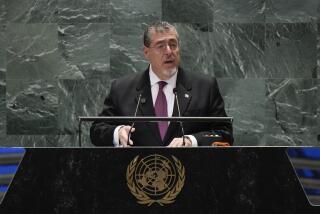Welcome to the Sheraton; Ignore the Red Stickers
The swank Sheraton Maria Isabel Hotel aspires to be many things, but a symbol of U.S. imperialism is not one of them.
But such has been the case since Feb. 3, when staff at the U.S.-owned hotel just across from the American Embassy politely suggested that 16 visiting Cuban officials check out.
The reason: U.S. Treasury officials had told the Sheraton’s owner, Starwood Hotels & Resorts Worldwide, of White Plains, N.Y., that taking money from the guests from Cuba violated the 4-decade-old U.S. embargo against the communist-run island.
Faced with the choice of being sanctioned and being selectively inhospitable, the Sheraton reluctantly chose the latter.
Mexicans exploded at the notion of U.S. laws being enforced on Mexican soil and called for authorities to shut the hotel down.
On Tuesday, the leftist-controlled Mexico City government finally succeeded in closing the 755-room hotel.
Or so it seemed.
Red stickers announcing that the Sheraton had been “closed down” were pasted on its front doors. Various government officials pronounced it closed, effective immediately. Mexican television announced that all guests would be evicted in two hours.
City inspectors posted a series of handwritten notes on a hotel bulletin board in half a dozen languages, telling the guests they would have to leave. Then the inspectors went home. Two hours passed. The hotel remained open.
Arriving at the hotel just after sunset Tuesday, British guest Anthony Thompson set down his bags, frowned at the “closed” signs and uttered an English expletive understood by the Mexican journalists encamped outside the lobby.
A concierge in a natty aquamarine uniform told Thompson not to worry, then escorted him into the hotel.
“It’s open,” the concierge told another guest in Spanish. “If the reporters ask you questions, don’t answer.”
Under U.S. law, the Cuba embargo applies to all U.S. companies and their foreign subsidiaries.
The Cuban officials at the hotel were meeting with U.S. oil executives at a trade conference, where they were discussing future investments.
Mexico maintains diplomatic and commercial relations with Cuba.
The eviction of the officials quickly became an issue in Mexico’s presidential campaign.
“The expulsion of the Cubans ... is a shameful act,” Humberto Musacchio wrote in the Mexico City newspaper Reforma. His was one of a flood of columns in the Mexican press denouncing the hotel.
The eviction was “practically a declaration of war” because Mexico’s “national honor has been sullied.”
Raymundo Riva Palacio, a columnist for the newspaper El Universal, wrote that it was common knowledge that the fifth floor of the hotel once functioned as “the headquarters of the CIA” in Mexico.
In Washington, State Department spokesman Sean McCormack was drawn into the fray.
“U.S. law would apply to U.S. corporations or subsidiaries of U.S. corporations no matter where they may be,” McCormack explained, “whether it’s in Mexico City or in Europe or South America.”
Foreign Minister Luis Ernesto Derbez, a member of the conservative National Action Party, initially said the Mexican government would not intervene. Later, in the face of mounting criticism, he said the hotel chain had shown a “disregard for Mexican law” that could lead to “appropriate sanctions.”
Mexico City’s government, controlled by members of the Democratic Revolution Party, whose presidential candidate, Andres Manuel Lopez Obrador, was once mayor, beat the federales to the punch. City building inspectors showed up days after the eviction.
Virginia Jaramillo Flores, the head of the city borough in which the hotel is located, said Tuesday that the inspectors had found dozens of violations at the Sheraton.
In a nation where illegal construction is the norm, the hotel was cited for allegedly failing to obtain a permit for 32,000 square feet of new construction. In addition, inspectors found two bars lacking licenses, and not enough parking spaces.
Jaramillo said city inspectors were not aware of the violations at the landmark hotel -- President Kennedy stayed there in 1962 -- because no one had complained before.
The closure would commence immediately and remain in effect until the offending construction was removed and 1,000 parking spaces added, Jaramillo said. Plus, there was a $15,000 fine to be paid.
An hour later, inspectors were pasting the “closed” signs on the hotel’s doors, which nonetheless remained unlocked.
“The Hotel Sheraton Maria Isabel expresses its great surprise in response to this action,” Laura Canepa, a representative for Starwood Hotels, told the reporters gathered outside. “At this moment our lawyers are evaluating the legal, administrative and business implications of this measure.”
By late Tuesday afternoon, as the hotel’s lawyers conferred in the lobby, it remained unclear whether the Sheraton’s hundreds of well-heeled guests would be forced to seek new lodgings.
“The hotel is still operating, even with the [closure] seals, which are really bad for Mexico’s image,” said Jorge Hernandez Delgado, president of the Mexican Assn. of Travel Agents. “We’re doing the best we can to bring tourism here, only to have these types of political actions that ruin everything.”
Guests continued to check in to the hotel well into the evening, however. Mexico City authorities made no attempt to stop them. The hotel continued to take reservations.
“The hotel is definitely closed,” a spokeswoman for the city government said. “At this moment, it really shouldn’t be operating.”
*
Times staff writer Cecilia Sanchez contributed to this report.
More to Read
Sign up for Essential California
The most important California stories and recommendations in your inbox every morning.
You may occasionally receive promotional content from the Los Angeles Times.











